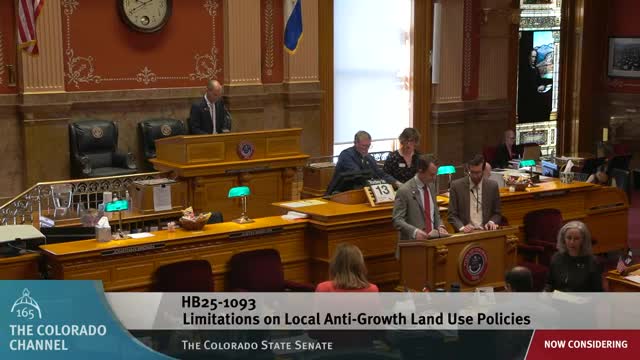Senate adopts bill limiting local restrictions on growth in urban areas after amendments
Get AI-powered insights, summaries, and transcripts
Subscribe
Summary
The Colorado Senate on March 13 approved House Bill 10‑93, a measure that narrows when local land-use conditions can be used to restrict housing growth in census-designated urban areas, after adopting an amendment clarifying treatment for land adjacent to wildlife crossings.
House Bill 10‑93, which restricts local measures that effectively prevent new development in defined urban areas, was adopted by the Colorado Senate on March 13 after floor debate and an amendment clarifying how the bill treats land around wildlife crossings.
The bill, sponsored in the House by Representatives Stewart and Barone and carried in the Senate by Senator Ball, moves to limit local land-use actions that would impose conditions effectively preventing growth in census-designated urban areas. Senator Ball told colleagues the committee added a minor amendment setting the bill’s effective date to July 1, 2025.
Senators debated the bill’s effect on wildfire-prone areas and local control. “I won't be able to vote for this bill today because of the wildfire issues that this presents,” Senator Snyder said, citing wildfire risk in the wildland‑urban interface and evacuation concerns. Several senators argued the measure intrudes on local land-use authority. “The locals know what is best for their communities,” Senator Arpelt said.
Supporters said the bill is narrowly targeted and intended to close what sponsors described as a loophole that allowed certain municipal initiatives to circumvent existing state law. “This bill simply closes a loophole,” a sponsor said on the floor, adding the legislation applies to less than 5% of state land and is focused on designated urban areas.
An amendment (L007) adopted on the floor exempts land directly adjacent to wildlife‑crossing structures from the bill’s anti‑growth overlay and clarifies that rezoning that would limit or prohibit growth in conjunction with facilitating a wildlife crossing is permissible. The amendment passed on a voice vote, and the body then adopted the bill.
The Senate passed House Bill 10‑93 by voice vote; the clerk recorded “The ayes have it, and 10 93 is adopted.” The measure will move on for enrollment and whatever subsequent steps are required under legislative process.
Because senators pressed concerns about wildfire risk, evacuation logistics and property‑rights impacts, the sponsors acknowledged those issues on the floor and referenced committee work to refine the bill before final adoption. The bill’s floor debate combined policy, constituent concerns and a technical amendment that sponsors said preserved the bill’s intent while addressing questions raised in committee.
